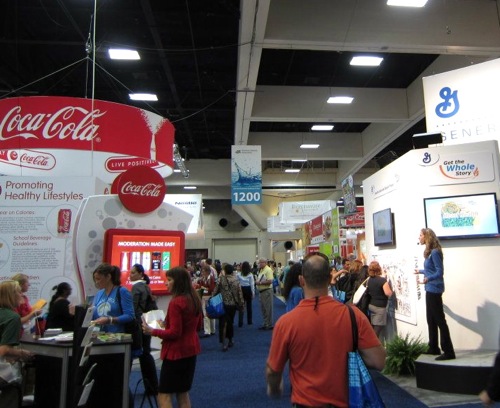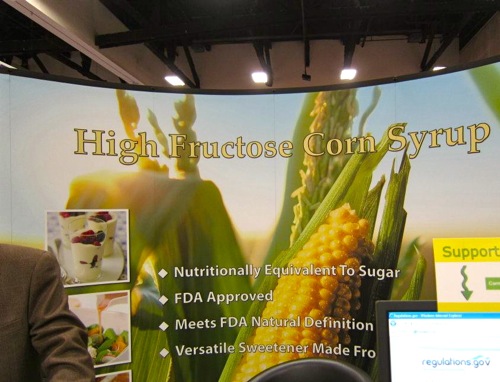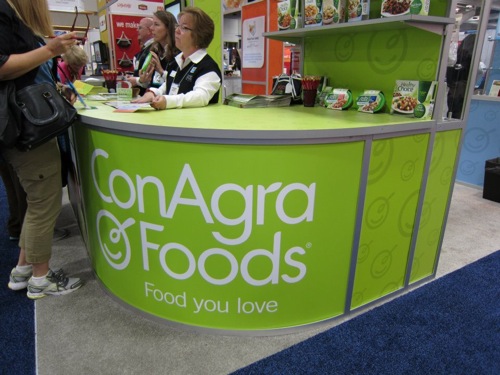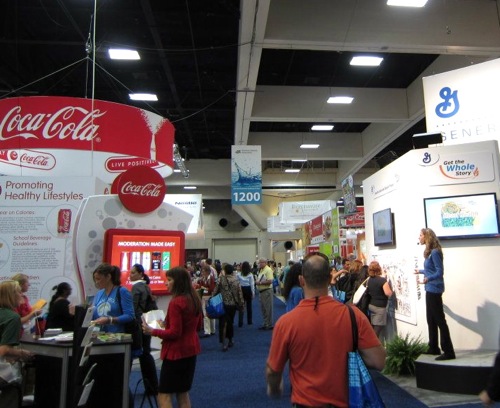 The FNCE show floorIt’s the second day of the Food & Nutrition Conference and Expo (FNCE), the annual conference of The American Dietetic Association (ADA) — often dubbed “the world’s largest meeting of food and nutrition experts.” One of the morning’s sessions — titled A Fresh Look At Processed Foods — is well attended by around 200-300 registered dietitians (RDs), researchers, policy makers, and health-care providers.
The FNCE show floorIt’s the second day of the Food & Nutrition Conference and Expo (FNCE), the annual conference of The American Dietetic Association (ADA) — often dubbed “the world’s largest meeting of food and nutrition experts.” One of the morning’s sessions — titled A Fresh Look At Processed Foods — is well attended by around 200-300 registered dietitians (RDs), researchers, policy makers, and health-care providers.
Victor Fulgoni, a 15-year Kellogg’s veteran, who now runs a consulting firm called Nutrition Impact, asks the audience for help. “Rather than removing [processed foods] from the diet, let’s use the power in this room to get consumers to choose the best processed foods available,” he says.
Fulgoni and his co-presenters Connie Weaver and Lindsey Loving tell the audience that not all processed foods are created equally. Furthermore, they say advances like pasteurization have brought important gains in terms of food safety, while stealth nutrition tactics have successfully upped American’s intake of nutrients like vitamin D and folic acid.
It’s no secret that processed foods have taken a real beating in the eyes of the public — which makes the pleas from the panel all the more startling. “Processed foods have become the default for everything negative, and their benefits are often taken for granted,” says Ms. Loving, whose employer, the International Food Information Council, has a board of trustees that includes representatives from Dannon Co., General Mills, Kraft Foods, PepsiCo, and Mars, Inc. Processed foods, she adds, “represent sources of important nutrients for consumers and should be eaten along with fresh fruits and veggies.”
Dr. Weaver concurs. She works for Purdue University, where her department has secured funding from the likes of Kraft, Nestle, and Monsanto. Repeatedly during the session, panelists urge the audience to “help get the word out” on just which processed foods are better choices, though exactly which ones they mean are never clearly pointed out.
The changing face of nutrition
 High Fructose Corn Syrup in the house.This session is only one of several like it at this year’s FNCE, which is said to attract around 6,000 people. The ADA holds sway with approximately 72,000 members, most of which are registered dietitians. But the association, which is known for accrediting nutrition programs around the country, credentialing professionals in the field, publishing peer-reviewed science, and advocating for public policy, is also increasingly under fire for working with some of the nation’s largest industrial food producers. (Tom Philpott reported on the trend in 2007 for Grist.) Of course, not all registered dietitians are feeding from the corporate chuck wagon; in fact, many are outwardly critical, and some have left the association all together.
High Fructose Corn Syrup in the house.This session is only one of several like it at this year’s FNCE, which is said to attract around 6,000 people. The ADA holds sway with approximately 72,000 members, most of which are registered dietitians. But the association, which is known for accrediting nutrition programs around the country, credentialing professionals in the field, publishing peer-reviewed science, and advocating for public policy, is also increasingly under fire for working with some of the nation’s largest industrial food producers. (Tom Philpott reported on the trend in 2007 for Grist.) Of course, not all registered dietitians are feeding from the corporate chuck wagon; in fact, many are outwardly critical, and some have left the association all together.
This year — as if to reiterate its influence over American’s dietary choices — the group announced it would soon be adding the word “nutrition” to its name (as of January 2012, the group will be called the Academy of Nutrition and Dietetics). Meanwhile, the show floor was saturated with booths and displays from companies like Monsanto, Hershey’s, Coca-Cola, McDonald’s, Cargill, Yum! Brands, Nestle, ConAgra, Mars, Inc., Campbell’s, and General Mills.
The ADA’s guidelines for corporate sponsorship state:
[Our] procedures and formal agreements with external organizations are designed to prevent any undue corporate influence, particularly where there is a possibility that corporate self-interest might tend to conflict with sound science or ADA positions, policies and philosophies.
But just how they define “influence” is unclear.
Black sheep dietitians
ADA members are encouraged to join practice groups that focus on their area of specialty: elder care, diabetes, sports nutrition, etc. One of the youngest and fastest-growing groups, Hunger and Environmental Nutrition (HEN), sticks out from the rest.
Members look at issues like antibiotic use in animals, clean water issues, and social justice, often finding themselves uncomfortably at odds with some of the messages being promoted by the speakers and corporate sponsors at the FNCE conference. Some have even opted out entirely, giving up the networking, camaraderie, and learning opportunities offered by the conference altogether. Nearly 200 of HEN’s 1,400 members have recently joined a separate listserv, launched in April 2011, known as Progressive Nutritionists, where they hope to carve out a place where they can speak freely without the ADA listening in.
“Corporate sponsorship from Coca-Cola and Hershey’s broke the camel’s back for a lot of members,” says Ashley Colpaart, RD, a public policy committee member for HEN, and an instructor at Texas State University. She says part of the reason for creating the listserv was to capture those disenchanted with ADA policies towards corporate sponsorship.
Kelly Horton, RD, is a former HEN group chair; she had been an ADA member since 2004, but she has recently walked away from the organization.
“There are many of us who don’t want McDonald’s at our expo; we don’t want Hershey’s as a sponsor,” Horton says.”There [was] value to being part of HEN, but I didn’t want to be a member of HEN if it’s part of the ADA.”
 Conagra, the brand that tried to trick food bloggers earlier this month had a big presence at the conference.Photos: Clare Leschin-HoarThe culinary disconnect
Conagra, the brand that tried to trick food bloggers earlier this month had a big presence at the conference.Photos: Clare Leschin-HoarThe culinary disconnect
Corporate influence among RDs isn’t limited to the ADA. Bryan Roof is an RD and senior editor at Cooks Illustrated who also writes the monthly “Culinary Corner” column for Today’s Dietitian magazine. He says he’s recently had to defend using whole ingredients in his recipes, including foods like olive oil and kosher salt, after an RD reader wrote to complain.
On the other hand, flip to the back of the magazine and you’ll find a jaw-dropping Q&A interview with Kyle Shadix, a chef and RD who seems to have landed his “dream job” with PepsiCo. When asked what foods he craved, Shadix’s responded: “I crave KFC Original chicken thighs, Reese’s Peanut Butter Cups, and York Peppermint Patties with Pepsi Max.” (The latter is a sugar-free version of the popular soft drink that contains aspartame, potassium benzoate, and nearly double the caffeine.)
This disconnect, evident in Today’s Dietitian and elsewhere, doesn’t exactly surprise Roof — but he does propose a simple solution. “I would like to see more RDs getting into the kitchen to give advice about how to plan menus and prepare meals at home,” he says.
Not everyone looks to registered dietitians for help, but many of those living with serious health conditions like diabetes and obesity are already seeing the impacts of diets heavily weighted toward processed foods. For Horton, not speaking out about this connection would go against her personal code of ethics as well as the code she agreed to when she became an RD.
“The bigger message here,” she says, “is that we should not be partnering with companies that are contributing to rising costs of healthcare by way of malnutrition, diabetes and obesity.”



